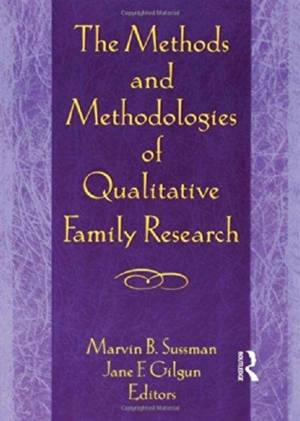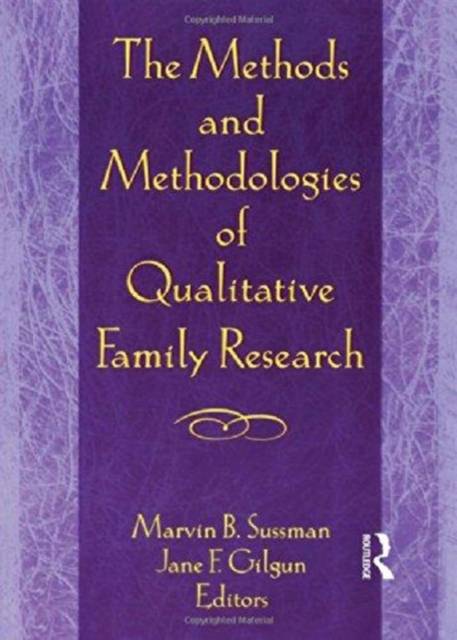
- Afhalen na 1 uur in een winkel met voorraad
- Gratis thuislevering in België vanaf € 30
- Ruim aanbod met 7 miljoen producten
- Afhalen na 1 uur in een winkel met voorraad
- Gratis thuislevering in België vanaf € 30
- Ruim aanbod met 7 miljoen producten
The Methods and Methodologies of Qualitative Family Research
Janet F Gilgun, Marvin B SussmanOmschrijving
The Methods and Methodologies of Qualitative Family Research can provide you with a strong conceptual framework for undertaking qualitative research. As it explores inquiry and theory on the cutting edge, it shows how qualitative methodologies can be applied to family life, education, and research. Designed to demonstrate how emerging and established methodologies can advance the understanding of families and direct social change, this book is a major step in assessing the development, progress, and contributions of qualitative inquiry. Packed with useful information and innovative approaches, this volume pulls together a rich and diverse group of essays that teach readers about the complexities and challenges of qualitative research. Most importantly, you'll learn how new qualitative approaches are grounded in systems thinking, holistic formulations, attention to context, cultural sensitivity, and nonlinear dynamics.The Methods and Methodologies of Qualitative Family Research is distinct from other books of its kind because it acknowledges the agent, or self, in compiling data and reaching conclusions. Moreover, it analyzes how studying the world affects those doing the studying and how those effects, in turn, play a substantial role in interpreting data and forming conclusions. The Methods and Methodologies of Qualitative Family Research introduces three major types of qualitative clinical family research: conversational analysis, recursive frame analysis, and hermeneutic phenomenology. It exposes a wide array of resources for undertaking qualitative inquiry, including data journals, letters, official files, clinical case notes, folk tales, interviews, and field observations. You'll learn how these resources are invaluable tools for understanding:
- couples'decisionmaking
- generative fathering
- reflexivity
- the use of historical data to construct composite cases
- egalitarianism and oppression in marriage
- perceptions of gender, race, and class among African-American adolescent women
- successful aging among individuals who require long-term care
- poverty and access to servicesA skillful blend of theory and practice, The Methods and Methodologies of Qualitative Family Research offers conceptual schemes, bibliographies, and other useful resources for teaching and conducting qualitative research. It will revolutionize the way you think about qualitative inquiry and your own approaches to qualitative family research. In addition, you'll come away updated on the current state of qualitative research and with new skills and techniques for tackling your own research.
Specificaties
Betrokkenen
- Auteur(s):
- Uitgeverij:
Inhoud
- Aantal bladzijden:
- 450
- Taal:
- Engels
Eigenschappen
- Productcode (EAN):
- 9780789000156
- Verschijningsdatum:
- 23/05/1997
- Uitvoering:
- Hardcover
- Formaat:
- Genaaid
- Afmetingen:
- 152 mm x 213 mm
- Gewicht:
- 860 g

Alleen bij Standaard Boekhandel
Beoordelingen
We publiceren alleen reviews die voldoen aan de voorwaarden voor reviews. Bekijk onze voorwaarden voor reviews.











